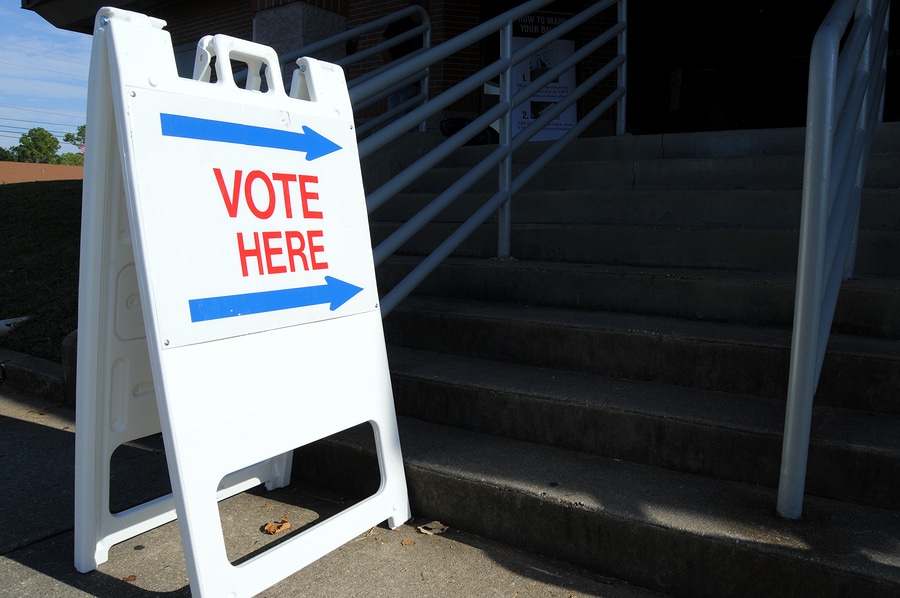Question 1: Massachusetts Nurse-To-Patient Ratio Ballot Initiative Defeated

Massachusetts’ Question 1, a ballot initiative that would have established mandatory nurse-patient ratios in hospitals was defeated during the general election Tuesday. The Massachusetts Nurses Association, a union representing nurses in 51 acute care hospitals across the state, conceded defeat around 9 p.m. Tuesday evening. At approximately 10:20 p.m., the initiative had 969,400 votes against and 416,720 votes in favor, with more than 50 of precincts reporting, according to the preliminary results. “We are all disappointed by tonight’s results and the impact this will have on the patients we care for every day,” MNA President Donna Kelly-Williams said in prepared remarks. “We know that right now – as I speak to you here – there are nurses caring for too many patients and those patients are unnecessarily being put in harm’s way. And the problem continues to grow every year. The status quo is not a solution here.” The outcome was a victory for the Massachusetts Health and Hospital Association, who opposed the initiative for fear that it would dramatically increase state healthcare costs. The association represents 70 hospitals across the state. “This is the beginning of a conversation, not the end,” MHA President and CEO Steve Walsh said in a statement to Mass Live. “Question 1 forced some difficult and necessary discussions about the future of healthcare and the future of our workforce going forward. These conversations with our care teams and in our communities have been critically important and will continue in bargaining sessions, legislative debates, board rooms and newspapers.” An independent study conducted by the state’s Health Policy Commission found that implementing the mandate would cost an estimated $676-949 million per year and potentially save $34-47 million. The study also found that hospitals would need to hire 2,286 to 3,101 additional full-time equivalent nurses to meet the mandate.
2018 Election: Healthcare Issues Travelers Should Watch

One of the benefits of being a travel healthcare professional can be the opportunity to avoid hospital politics, but national politics are much harder to ignore. Many hot-button healthcare issues decided at the polls can have a direct impact on the travel healthcare job market, both positive and negative, and the 2018 midterm election on November 6 is no exception. Below, we’ve provided brief summaries on ballot initiatives across the country that could have tangible effects on the travel healthcare market. For those who need more information on when, where and how to vote in the midterms, check out our 2018 midterm election voting FAQ. 2018 Election Healthcare Issues California Prop 4, Children’s Hospital Bond Initiative Proposition 4, also known as the Children’s Hospital Bond Act Fund, would authorize $1.5 billion in bonds that would be used to award grants to children’s hospitals for construction, expansion, renovation, and equipment projects. With interest over 35 years, the bond’s total cost would be $2.9 billion. The bonds would be repaid over a period of time from the state’s General Fund, according to the state website. According to Ballotpedia, the $1.5 billion would be distributed as follows: 72 percent ($1.08 billion) to eight nonprofit hospitals providing comprehensive services to high volumes of children eligible for governmental programs and children with special health needs eligible for California Children’s Services. 18 percent ($270 million) to five University of California general acute hospitals, including the University of California, Davis Children’s Hospital; Mattel Children’s Hospital at University of California, Los Angeles; University Children’s Hospital at University of California, Irvine; University of California, San Francisco Children’s Hospital; and University of California, San Diego Children’s Hospital. 10 percent ($150 million) to public and private hospitals that provide pediatric services to children eligible for California Children’s Services Why this is important for travelers If approved by Californa voters, the massive cashflow could provide many positive benefits for both children’s facilities and travelers. Hospitals would be able to update, renovate or construct new units, which could improve quality of care for patients, improve the working environment for healthcare professionals and potentially provide staffing opportunities for travelers. Idaho Proposition 2, Medicaid Expansion Initiative Idaho Medicaid expansion advocates successfully petitioned and gathered 75,314 verified signatures to add a Medicaid expansion measure to the ballot. The petition met both state requirements to qualify the ballot measure, gathering at least 56,192 verified signatures that represented at least 18 of Idaho’s 35 legislative districts. An expansion would allow Idaho residents under 65 and earning incomes at 138 percent of the national poverty level to apply for Medicaid insurance. About 62,000 Idahoans would qualify for this coverage. Expansion would also bring in $105 million in costs to the state over 10 years and $200 million in savings, according to an independent analysis by The Milliman consulting firm. Why this is important for travelers Studies have shown that hospitals in Medicaid expansion states have not only saved tremendously on uncompensated care costs, but they also have also seen more newly-insured patients coming in for healthcare services. The increased patient needs and loosened revenue streams could result in more opportunities for healthcare travelers. You can read more about this issue in our Medicaid expansion guide. Massachusetts Question 1, Nurse-Patient Assignment Limits Initiative Approval of Question 1 in Massachusetts would establish a set nurse-to-patient ratio across all state hospitals, except during a public health emergency. This measure would also require the limits to be met without a reduction in staff, and would allow the Massachusetts Health Policy Commission to regulate and enforce the initiative, which could result in $25,000 per incident for hospitals that violate the mandated ratios. If approved, Massachusetts would become the second state with mandated nurse-to-patient ratios—currently, California is the only state that has them. According to an independent study by the Massachusetts Health Policy Commission, implementing the mandate would cost from $676 million to $949 million per year. They also estimated possible savings of $34 million to $47 million from reduced hospital length of stay and potential for improved patient care with increased nurse staffing. State hospitals would also need to increase staffing by 2,286 to 3,101 additional full-time equivalent nurses to comply with the mandated ratios, according to the study. Medical-surgical and psychiatric nurses would present the greatest needs for increased staffing. Why this is important for travelers Of all the healthcare initiatives voters will decide on at the polls this fall, Question 1 could have the biggest and most direct impact on travel nurses. Mandated ratios mean more nurse hiring, which also means significantly more opportunities for travel nurses. You can find more information additional details on the impact of this change by checking out our recent coverage of the ballot issue. Utah Utah Proposition 3, Medicaid Expansion Initiative Utah Gov. Gary Herbert signed a bill on March 27, 2018, for partial Medicaid expansion, directing the state to seek federal approval to expand Medicaid to 100% of the federal poverty level. The bill stipulated using the ACA enhanced federal match rate and adding a work requirement for the expansion population. The Center for Medicare and Medicaid Services (CMS) has not approved waivers to access the match rate until Utah approves a full expansion. In the meantime, Utah expansion advocates garnered enough petition signatures to add a competing bill to November ballots that would approve a full expansion. An expansion would provide an estimated 150,000 Utah residents with Medicaid coverage. Why this is important for travelers Studies have shown that hospitals in Medicaid expansion states have not only saved tremendously on uncompensated care costs, but they also have also seen more newly-insured patients coming in for healthcare services. The increased patient needs and loosened revenue streams could result in more opportunities for healthcare travelers. You can read more about this issue in our Medicaid expansion guide. Nebraska Nebraska Initiative 427, Medicaid Expansion Similar to Idaho and Utah, Nebraska advocates have submitted a petition to add a Medicaid expansion initiative to the midterm election ballot. Supporters filed more than 133,000 signatures on July 5 and a large enough majority
Massachusetts Voters Split On Mandated Nurse Staffing

With only two weeks left until the Nov. 6 midterm election, Massachusetts voters are split evenly on establishing statewide mandated nurse-to-patient ratios, according to a new poll by WBUR, Boston’s NPR news station. Of the 506 Massachusetts residents surveyed, 44 percent were in favor of mandated nurse staffing, and 44 percent were opposed. The remaining 12 percent said they were undecided. Advocates for the mandate, also known as Question 1, have said establishing mandated nurse staffing ratios will lead to better patient outcomes and improve quality of care. Opponents have said the opposite and also claim mandated ratios will put an expensive burden on state hospitals. Both sides claim nurses fully support them. Both groups have spent a combined total of more than $14 million on competing TV advertisements and campaign initiatives. Because both groups have run similar ad campaigns, voters have had a difficult time figuring out how nurses actually feel about the issue, according to the WBUR report. The pro-mandate group, the Committee to Ensure Safe Patient Care, is sponsored by the Massachusetts Nurses Association. Most of the group’s supporters are nursing unions, labor unions, international labor unions and local community groups, according to their website. The group also earned key endorsements from several local, state and federal representatives, most notably Sen. Elizabeth Warren and Boston Mayor Martin J. Walsh. “Nurses work hard to take care of all of us when it matters the most, and we should do the same for them by establishing standards to ensure they have the help they need to do their job safely,” Senator Warren said in a press release. “I stand with our nurses and support a yes vote on Question 1 in November.” The opposing group, known as the Coalition to Protect Patient Safety, is supported mostly by hospitals, hospitals associations and local chambers of commerce, according to their website. The organization has also earned a handful of endorsements from local mayors, including Waltham Mayor Jeanette McCarthy. An independent study conducted by the state’s Health Policy Commission found that implementing the mandate would cost an estimated $676-949 million per year and potentially save $34-47 million. The study also found that hospitals would need to hire 2,286 to 3,101 additional full-time equivalent nurses to meet the mandate. You can read the full analysis of the study below:
Mass. Nurses Argue Pros, Cons of Mandated Ratios In Ads For Ballot Initiative

Already know all about Question 1 in Massachusetts? Click here to read about how this could impact travel nursing in the state. Massachusetts nurses are arguing on both sides of the fence in the first wave of TV advertisements about a ballot initiative that would regulate nurse staffing ratios in the state, according to a Boston Globe report. The Massachusetts Nurses Association, which sponsored the initiative, supports the Committee to Ensure Safe Patient Care along with many other local labor unions both in and out of the state. The committee argues that safe staffing ratios in non-ICU units will cut down on patient complications, readmissions, errors and potentially life-threatening risks. The Coalition To Protect Patient Safety, an anti-initiative group backed by state hospital groups and local chambers of commerce, argue that adopting a rigid proposal will “take decision-making power out of the hands of healthcare professionals” and negatively impact hospital costs and quality of care. While both groups stances on Question 1 are clearly opposed, their similar advertising and marketing strategies could cause confusion for uninformed voters, according to the Globe report. Both groups have similar names, use nurse testimonials in their website advertisements, feature similarly designed lawn signs and even have nearly identical Twitter handles. (Pro-initiative @PatientSafetyMA and anti-initiative @MAPatientSafety) Both groups are ramping up advertising efforts ahead of the Nov. 6 midterm elections. If approved by voters, the initiative would establish patient limits determined by the type of medical unit or patient with whom a nurse is working, and the limit would be applied at all times, according to the Massachusetts Secretary of State website. Civil penalties for hospitals that don’t comply with the mandated ratios could go up to $25,000 per violation, along with $250-2,500 in fines per day for facilities that don’t have information about the limits in all patient rooms, units and patient areas. How “Yes” On Question 1 Could Affect Travelers In short, mandated nurse-to-patient ratios across the state could sharply increase nurse recruiting and retention efforts by hospitals, which in turn could increase the amount of travel nurse needs. While multiple states have laws relating to nurse staffing ratios, only California has both passed and implemented mandatory statewide ratios. The state passed the law in 1999, implemented it completely by 2004, and since then has been the source of numerous studies about the impact of mandated ratios. Most studies found positive benefits for patient outcomes, significantly lower mortality rates and reduced nurse burnout, but several also point to greatly increased staffing efforts leading up to and after implementation. A 2008 study submitted to the Journal of Hospital Medicine found that nurse staffing in California remained unchanged from 1993 to 1999, but facilities significantly increased staffing efforts between 1999 and 2004. As of 2017, the state had the highest number of registered nurses in the U.S. at 282,290, according to Bureau of Labor Statistics data. It also holds the top spot for the number of active nursing licenses with more than 432,000 as of Sept. 8, according to National Council of State Boards of Nursing data. There are other factors to consider when determining why California brings in so many nurses—geographic diversity, lots of rural communities, high paying contracts—but many staff and travel nurses cite mandated ratios as a positive benefit of working in the state, which could help with hospital recruiting.
